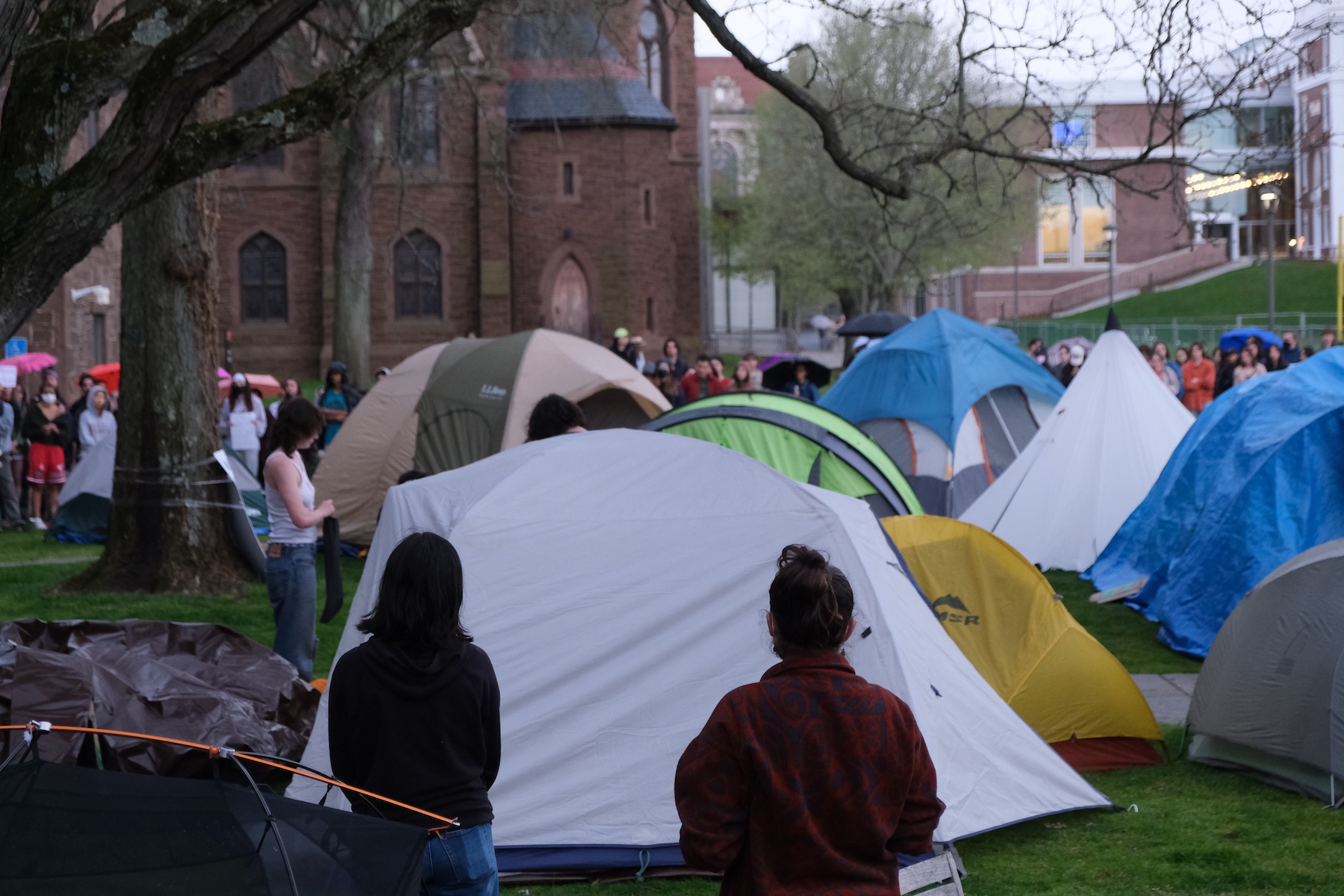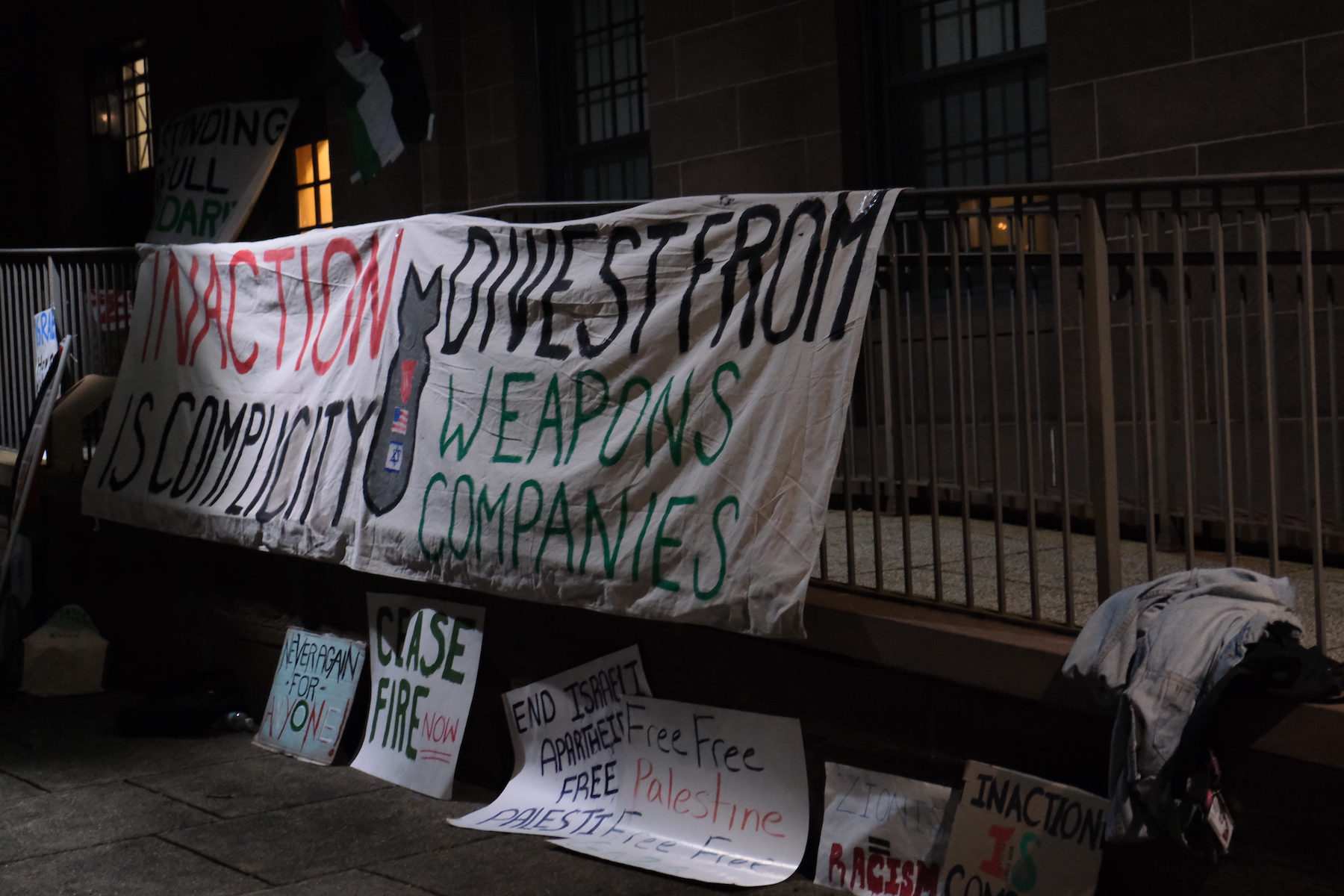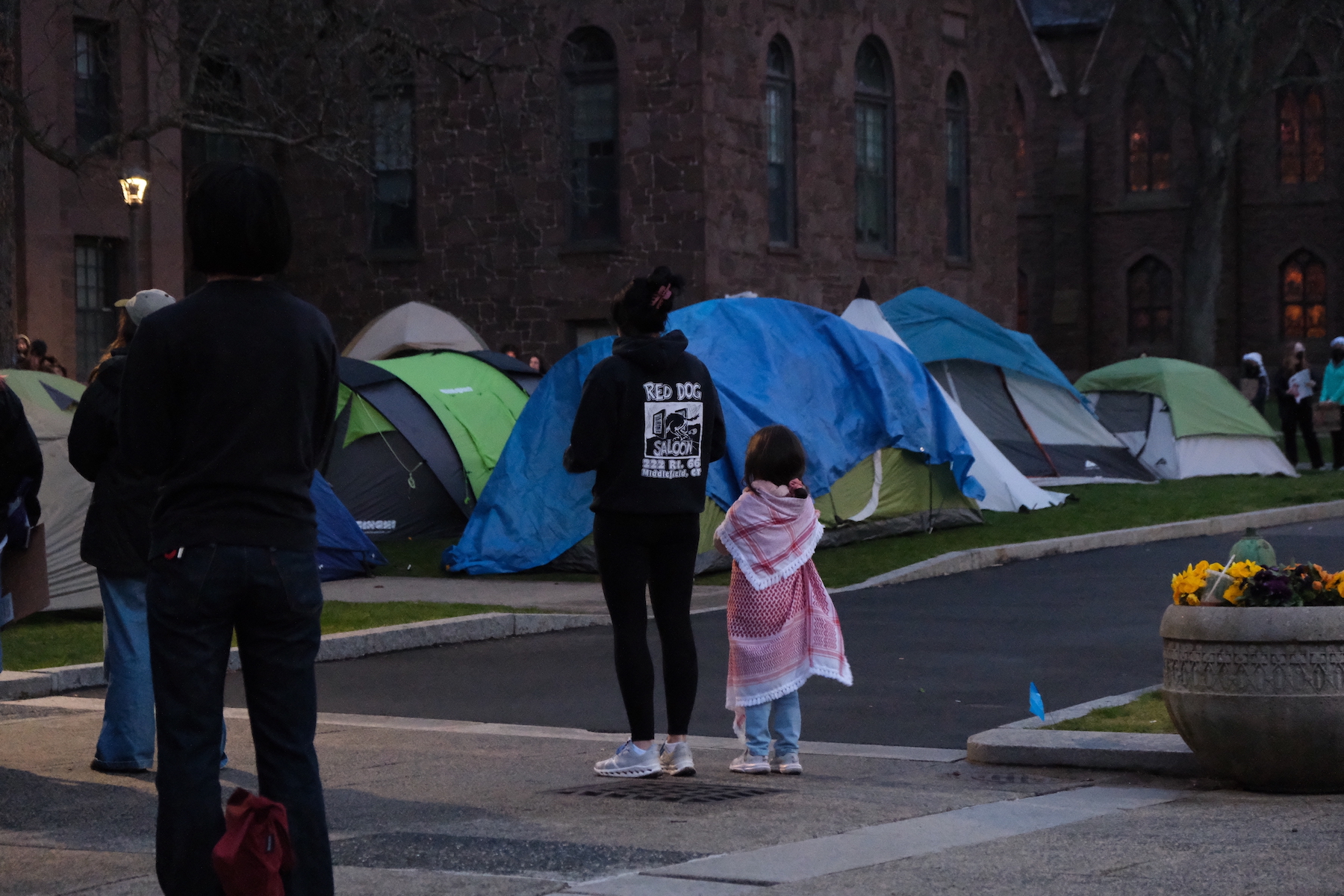
Following a growing number of encampments in solidarity with Palestine and protests for divestment at universities across the United States, organizers with Wesleyan Students for Justice in Palestine (SJP) began an encampment in solidarity with Palestine between North College and Andrus Field at 6 p.m. on Sunday, April 28. Hundreds of people were present at the rally, and over 60 individuals were actively involved in the encampment overnight. Organizers and participants plan to remain in place until the University agrees to their demands, and urged more students to join their movement.
“We are going to learn from our predecessors and be here, and camp out, and make sure that Wesleyan cannot forget its complicity with the violence that is occurring globally,” encampment media spokesperson Amira Pierotti ’26 said. “[We are] calling on our leaders to do better, and calling on each other to do better, because we all have more to learn.”
Recently, international news outlets have reported that Israel continues to bomb Rafah, a city in southern Gaza where over a million Palestinians have sought refuge. The Palestinian death toll has risen to nearly 35,000 killed since Oct. 7, with approximately 78,000 injured and more than 8,000 missing. Hamas militants killed around 1,200 people during the Oct. 7 raid, and an estimated 276 Israeli citizens have died in the conflict since then. The group also abducted around 250 hostages, around 100 of whom Israel says are still in captivity, along with the remains of more than 30 others.
As this conflict has continued to rage, many college campuses in the United States have become sites of mass protest. The Wesleyan encampment follows the example of similar occupations, which began with a sit-in at Vanderbilt University and an encampment at Columbia University. Wesleyan is the third university in Connecticut to join this escalation in student action, following Yale University and the University of Connecticut. The encampment went up after some Wesleyan students attended a protest organized by Connecticut Palestine Solidarity Coalition on the same day in New Haven.

The rally began promptly at 6 p.m. and garnered over 400 participants, according to student organizers. Face masks were distributed to conceal the identities of concerned students and students closest to the speakers, who were most likely to be photographed. Faculty, staff, students, and Middletown residents formed a circle around the green between North College and Andrus Field, reciting chants demanding divestment and accountability.
SJP, in conjunction with the Connecticut Palestine Solidarity Coalition, read aloud from a list of demands, which they later published on their Instagram page.
“We demand that Wesleyan University disclose financial investments and divest from all companies and institutions that profit from Israeli settler colonial apartheid and occupation in Palestine—including weapons, tech and surveillance, and construction companies—with full transparency regarding those investments and a public commitment to divest,” the statement says.
Other demands include the termination of all programs and affiliations with Israeli academic institutions and the restriction of companies targeted for divestment from recruiting on campus. SJP also demands that the University protect the free speech of students, faculty, and staff by ensuring there will be no penalties for protesting.
“It was definitely an energizing space to be in,” SJP student organizer Liam Dorrien ’27 said. “I was very glad to just share solidarity with all of the students around me who are committed to the cause of ending the genocide in Gaza and conceding genocide in Palestine…. It makes you feel like a part of a much larger movement.”
The student protestors were joined by members of the Wesleyan Alumni for Justice in Palestine, who arrived on campus to participate in the pro-Palestine demonstrations and urge action on behalf of the entire student, alumni, and faculty body of the University. Featured rally speakers Bryan Chong ’21 and Bulaong Ramiz ’11 agreed that the demonstration was the largest they have seen in their careers at Wesleyan, and, as far as they could recall, in University history.
“It has exceeded anything I’ve ever been a part of,” Chong said. “[This shows] the extent to which alumni feel very, very strongly that this is something Wesleyan needs to take action on.”
Ramiz sees the current pro-Palestine solidarity movement as equal in magnitude to previous large-scale student protests, including the fight for African American Studies, protests against the South African apartheid, and the Fisk Takeover. Ramiz and Chong express hope that the encampment will live on to be a crucial part of Wesleyan’s rich legacy of student activism, similar to the student movements before them.
“I stumbled onto Twitter and saw a clip of Wesleyan students in 1988 protesting South African apartheid,” Chong said. “It’s touching to see that three, four decades after the fact, still there are students who will carry that banner for justice and dignity across the world, carrying that mission of activism and protest.”
Ramiz and Chong hope that other Wesleyan alumni will join in advancing the cause of University divestment. While both expressed admiration for the work student activists had done so far, and the diversity at the protest, Ramiz believes there is still work to be done.
“You [can] become part of the system and problem,” Ramiz said. “Even if you’re an undergrad, if you are not brave enough or willing enough to influence and change the system, you get lost in it.”
The protest also attracted a group of students counterprotesting with an Israeli flag and a sign calling for the release of Israeli hostages.
“I’d like to make it clear that I’m standing with an Israeli flag tonight because I believe that Israel has a right to exist, BUT not that I believe that Bibi Netanyahu is making all the right choices,” Alex Janower ’27 wrote in a message to The Argus. “Just like I’m an American who doesn’t support Trump’s choices, I’m an Israeli who doesn’t support Netanyahu’s. And like most Wes students, I believe that the Palestinian death toll is horrific and many things must change. We may disagree on how that should happen, but mostly I’m standing here tonight to counterbalance the hateful sentiment that I’m hearing.”
Janower points to calls and cheers for globalizing the intifada—which she cites as an extension of Hamas’ pursuit of jihad and promotion of the continued massacre of Jewish people—as hateful speech from the pro-Palestine rally and encampment.
“A lot of what the protesters are chanting is valid,” Janower wrote. “Whether or not I agree is an entirely different question, but I respect their activism for the most part. But cheering for globalizing the intifada? That’s different. That’s violent and hateful and terrifying and exclusive and so so much more.”
Graduate student Batya Kline, an SJP organizer, responded to these claims by stating that the intifada, rather than a call for violence, was instead an organized resistance against colonialism.
“As a Jewish person, I very much resonate [with intifada], especially during the season of Passover, where we remember when Jews were enslaved in Egypt, and they shook off their chains, with the help of God,” Kline said. “We remember that in this season, and we call on our responsibility to assist the shaking off of those chains in every context where people are oppressed, through enslavement, through colonization, through the horrifying apartheid system that is in Israel now.”
Approximately an hour after the protest began, President Michael Roth ’78 left his meeting with the Wesleyan Student Assembly in Boger Hall through the back exit of the building, heading towards his house next door. Student protesters inside Boger notified the crowd of Roth’s location, leading dozens of protesters to follow him while chanting and ringing cowbells. Two Public Safety (PSafe) officers escorted Roth through the crowd into his home. Although a handful of protesters went onto his lawn and were promptly escorted off by PSafe, neither Roth nor his family were closely approached or harmed. Once Roth entered his house, the protesters circled around Wyllys Avenue to High Street, massing around the front gate of the house.
“Michael Roth, you can’t hide, we charge you with genocide,” student protesters said before dispersing and making their way back to North College.
The crowds around the encampment gradually began thinning as it grew darker, with the rally ending at around 9 p.m. The approximately 60 students staying overnight, who had gathered food from Usdan University Center, as well as cases of bottled water, began to set up their tents. According to the organizers, there was not enough space to accommodate all interested parties, but they hope to see an expansion in sleeping capacity in the coming days.
“We ran up to everyone who brought over tents and asked them who they wanted to bring with them, to do a headcount,” Dorrien said. “Basically just we tried to get everyone…to attend.”
In the tents, students used the time to get to know one another and connect over a shared mission.
“I think last night was the perfect time. It wasn’t too cold,” Clara Medina ’26 said. “People were up until 2 [or] 3 a.m., playing music on the guitar, talking…. It’s the most connected I’ve ever felt to the Wesleyan community.”

Many students plan to stand their ground, determined to stay in the encampments until finals week and even through Commencement Weekend on May 25 and 26. Organizers expect that immediate needs, including more tents, camping chairs, and sleeping bags, will be provided by members of the community in the coming days, and the encampment space and amount of student solidarity will only continue to grow.
“It was a beautiful night out, but it’s not something that we want…to be doing,” encampment organizer Rowan Roudebush ’27 said. “It is inspiring to see the amount of solidarity we have here, and to kind of really feel the power of our movement.”
Some students expressed concerns about safety in regard to the encampment. The University confirmed in a statement to The Argus that, as of publication, it has not arranged for any further security or support from the Middletown Police Department. Roth provided a link to a list of the University’s regulations about protests, but did not specify which ones protestors had broken.
“The students [at the encampment] know that they are in violation of university rules and seem willing to accept the consequences,” Roth wrote in an email to the student body on Monday, April 29. “The protest has been non-violent and has not disrupted normal campus operations. As long as it continues in this way, the University will not attempt to clear the encampment. The University will not tolerate intimidation or harassment of students, staff, or faculty. Protesters assure us that they have no intention of engaging in these kinds of actions.”
The encampment has seen a heightened presence of PSafe officers. Director of PSafe Scott Rohde pointed to the Student Conduct guidelines, particularly the Code of Non-Academic Conduct, for students to determine what is deemed intimidation or harassment. The University’s Disruption Guidelines also state that, while orderly and non-obstructive picketing, demonstrations, sit-ins, and student strikes are permitted, students may face disciplinary action if their activities obstruct curricular, co-curricular, administrative, or operational activities; prevent others from moving freely on any part of the University campus; disrupt proper use of University offices or facilities; endanger the safety of any person on University property; or destroy or damage property.
“Like with any special events or major events on campus, we provide extra visible patrol and react to behavior that’s concerning,” Rohde said. “It’s pretty straightforward—we don’t change just because it’s an encampment. Our job is to protect the campus community, and that’s done through presence and observation. We adapt to situations changing.”
The morning after the start of the encampment period, at 5:50 a.m., University protestors were confronted by campus officials. According to an SJP Instagram post, on the morning of Monday, Apr. 29 the University attempted to wash away the chalking near the encampment but students physically stopped it from being removed. A PSafe officer then arrived and took the ID of one student, but made no indications regarding potential disciplinary action.
“The first thing I saw of President Roth this [Apr. 29] morning was him shoving a camera in one of our organizer’s faces and trying to get a photo,” Roudebush said. “[Roth] went up to a journalist who was here, and told her that she wasn’t allowed to be here, even though she’d already gotten permission. He didn’t kick her off, but he tried to intimidate her, then he kept walking with his dog. Other than that, he made no acknowledgement of us, and didn’t indicate any interest in our demands.”
Roth has previously commented on the conflict. He called for a ceasefire first in a blog post to the University community on March 12, then again in an Inside Higher Ed article on March 25. However, he has also previously stated that he does not feel divestment from Israel is the appropriate path to take toward ending the Israel-Hamas war.
“Since the leaders of the Israeli government are motivated to prolong a war that serves their selfish political interests, U.S. government officials must make military assistance dependent on a plan for peace,” Roth wrote on April 27 for Forward, a publication delivering coverage of issues for the American Jewish population. “I so wish this was the object of student protest against the war in Gaza, rather than the fantasy of divestment. Modifying endowment policies at U.S. universities so that they don’t invest in Israeli companies or those that manufacture weapons would do nothing to help the plight of Gazans.”
SJP is planning to announce future programming on its Instagram page, posting upcoming events for every following day. Teach-ins will be held every day, and SJP members are hoping to see increased faculty participation in organizing open classes for students to discuss these current events.
“We want to use this liberated space, not only to disrupt the University, but also to grow our own solidarity through learning,” Kline said. “We have wonderful faculty and student experts who are sharing their knowledge with us so that we can be better allies, be better solidarity workers in support of Palestine. Professor [of American Studies] J. Kehaulani Kauanui shared her expertise on settler colonialism as an indigenous scholar who has worked extensively on the Hawaiian context and in Palestine.”
They anticipate concerts, readings, film screenings, and an open-mic event in the coming days to garner more support.
Overall, organizers and speakers were pleased with the rally turnout and hope to see the support continue to grow.
“What I saw yesterday was a deeply multi-racial crowd [and] multi-gendered crowd,” Chong said. “It shows that to anyone who dares to say this is just performative activism, mainly white upper-class college students who are deeply ignorant and misinformed, come and check out one of these actions sometimes…to see how students from all walks of life and different backgrounds are united under the same demands.”
Correction note on April 30, 2024: An earlier version of this article contained a quote from Bryan Chong ’21 incorrectly characterizing the degree of alumni involvement in the encampment protest as unique. The quote has been removed.
Please direct questions and concerns about Argus coverage to argus@wesleyan.edu.
Rose Chen can be reached at rchen@wesleyan.edu.
Carolyn Neugarten can be reached at cneugarten@wesleyan.edu.
Spencer Landers can be reached at sklanders@wesleyan.edu.



Leave a Reply